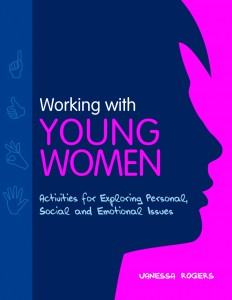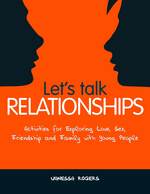 Vanessa Rogers is the author of Working with Young Women, Working with Young Men, Let’s Talk Relationships, 101 Things to Do on the Street amongst others. In this article she gives her writing tips for aspiring authors. And, if you’re feeling inspired feel free to send in your proposals to post@jkp.com
Vanessa Rogers is the author of Working with Young Women, Working with Young Men, Let’s Talk Relationships, 101 Things to Do on the Street amongst others. In this article she gives her writing tips for aspiring authors. And, if you’re feeling inspired feel free to send in your proposals to post@jkp.com
They say that there is a book in all of us, and judging from the number of emails and Tweets I get from people in the youth work and social education field inspired to write their own, it would certainly seem to be true. So this is a collective response to those of you who have asked me for ideas of how to start writing, and to share my personal experiences of writing a book. I hope it is useful – but please remember this is only my way, which I made up as I stumbled along the way.
 When I start a new resource book it is because the subject holds a compelling fascination for me. For example, ‘Working with Young Women’ (Jessica Kingsley Publishers ISBN 9781849050951) came out of lots of girls’ groups that I was facilitating at the time. The young women came to the group because they had been identified as at risk of offending and aggressive behaviour, but the more I got to know them the more I thought that a lot of their behaviour was actually a response to the bad relationships they had with their peers, parents and boy/girlfriends. It seemed to me that their anger and aggression was a coping mechanism that until now had worked for them. So, this made me question how young women can build a sense of self, gain confidence and assertiveness,
When I start a new resource book it is because the subject holds a compelling fascination for me. For example, ‘Working with Young Women’ (Jessica Kingsley Publishers ISBN 9781849050951) came out of lots of girls’ groups that I was facilitating at the time. The young women came to the group because they had been identified as at risk of offending and aggressive behaviour, but the more I got to know them the more I thought that a lot of their behaviour was actually a response to the bad relationships they had with their peers, parents and boy/girlfriends. It seemed to me that their anger and aggression was a coping mechanism that until now had worked for them. So, this made me question how young women can build a sense of self, gain confidence and assertiveness,  look at the role models they have and their aspirations for life – in a way that is interesting, non-judgemental and fun. After all, through the group work I was basically asking them to change their existing coping behaviour, (which whilst not necessarily socially acceptable to all, gave them the kudos and ‘respect’ they sought), to take a chance of being vulnerable and exploring things that hurt to find a better way with me. But it seemed that this was the foundation for everything else – e.g. if you value yourself and your body you are more likely to respect it and look after it.
look at the role models they have and their aspirations for life – in a way that is interesting, non-judgemental and fun. After all, through the group work I was basically asking them to change their existing coping behaviour, (which whilst not necessarily socially acceptable to all, gave them the kudos and ‘respect’ they sought), to take a chance of being vulnerable and exploring things that hurt to find a better way with me. But it seemed that this was the foundation for everything else – e.g. if you value yourself and your body you are more likely to respect it and look after it.
So from here, as for every other book I have written, I devised a series of questions that I wanted to answer. These help me keep focused and distill the essence of what I am trying to do.
After that, I spend about 3 months researching the topic. I do this by reading around the subject and trawling the Internet for ethical and correct data and statistics, but also by speaking with other practitioners and as many young people, or in the example above as many young women, as I can, to ask my questions and test out some of my theories. By now I usually have at least one box file filled with clippings and stuff, as well as my trusty notebook (I always have at least one hardback notebook on the go) filled with points to remember and ideas for games, quizzes or activities.
One thing; all of my session plans have to be tried out with young people before I will include them. For me, this part is one of the rules of my work to keep it ethical and grounded – it has to have been tried and tested and I have to know that young people will learn from it and more importantly enjoy doing so.
 As I write constantly this means that I often have ideas stashed on my computer that are developed later when the opportunity presents itself. I try my best to include lots of learning styles in the activities and this might mean that I write the same learning outcomes three times, with three different ideas for delivering them. So, as I try them out with young people I use the one that goes best and dump the rest. I also ask young people to give me feedback as the book comes together, which I value as they don’t hold back if they think it won’t work!
As I write constantly this means that I often have ideas stashed on my computer that are developed later when the opportunity presents itself. I try my best to include lots of learning styles in the activities and this might mean that I write the same learning outcomes three times, with three different ideas for delivering them. So, as I try them out with young people I use the one that goes best and dump the rest. I also ask young people to give me feedback as the book comes together, which I value as they don’t hold back if they think it won’t work!
Once this is done, I stick my main points on bits of paper around my desk and tell everyone that I am going to be ‘writing’. To my family this means that I am likely to be distracted, a bit bad tempered and the dinners will be rubbish for a while – but the good news is that I will be in the house for days on end and easily tempted to buy take-aways!! To my friends it means that if I do see them I am probably going to bore them witless by obsessing over my blossoming (or not) book. All training and other work is put on hold. And then – I write it.
I tend to write ‘all over’ my books – meaning that I might write part of the intro, then get a bit stuck so move on to one of the later chapters. It may look chaotic but it isn’t – more like putting a jigsaw together, because by this stage I know exactly what I want to write and how it will look at the end. I tend to really get into this bit so write day and night, with no adherence to office hours – I actually prefer working through the night so it is pretty usual for me to be writing between 2 and 5 a.m.
Once it is done – which usually takes about 7 days end to end – I put  it away for at least 3 days before getting it out and editing / doing the final writing.
it away for at least 3 days before getting it out and editing / doing the final writing.
Then it is off to Jessica Kingsley Publishers …… and I miss it like mad …… get a bit sad, like at the end of any relationship …… do any edits or re-writes asked of me by the editors and proof readers ….. and leave the printers to get on with it. In my head it is over.
I try and build a break in at this point so that I can have fun with friends and family and shake off the topic that has been all consuming for what might have been up to a year. And then, just when I think that I have had enough of writing, something sparks my interest – and the whole cycle begins again.
 I hope this helps – but as I say all writers are different and I am sure you will find your own way of working. My only advice would be, write for you and choose a subject you feel passionate about – if you aren’t at the start, you definitely won’t be at the end! My very best wishes and good luck with it – let me know how you get on.
I hope this helps – but as I say all writers are different and I am sure you will find your own way of working. My only advice would be, write for you and choose a subject you feel passionate about – if you aren’t at the start, you definitely won’t be at the end! My very best wishes and good luck with it – let me know how you get on.